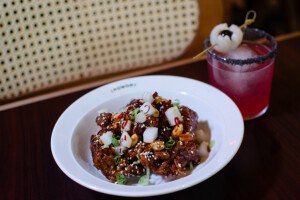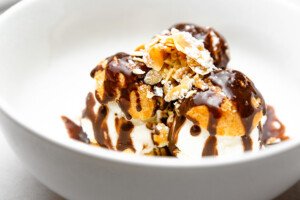Restaurant Review: Beacon Hill Bistro
Beacon Hill Bistro’s new-potato hash with pork. (Photograph by Angela Coppola)
Beacon Hill Bistro is a railroad-car-size talent incubator. Since 2000 it has launched a number of notable chefs, most significantly Jason Bond, who honed his deceptively simple, zealously fresh style of cuisine as the restaurant’s chef before departing in 2010 to open Bondir in Cambridge. There’s something about the simplicity of the space that makes it a blank canvas of sorts for cooks. It has the self-conscious French-bistro look, with its maroon leatherette banquettes, bentwood chairs, and black-and-white octagonal tile floors.
The heart-of-the-Hill address on Charles Street means this is haute-WASP central, with ladies in Mummy’s old mink and smiling blond families who could pose in ads for J. McLaughlin and North River Outfitter, the neighboring purveyors of lime green and high-water Nantucket red pants. Uncharitably put, this crowd will put up with a lot in the way of mediocre service and food in exchange for a place where they feel comfortable and among their own. The trouble is that lately, they need to.
That’s a real shame—not just because there’s something warm and soothing about a place so old-shoe comfortable, but because the current chef, Joshua Lewin, is another talent who deserves higher local visibility. A former Marine who grew up in western Massachusetts, Lewin is squarely in the skilled local-cuisine camp of Bond, and worked under him as sous chef back when he began at Beacon Hill Bistro. Lewin became executive chef in January 2012, and I first tried his food a year later, when he cooked a dinner in honor of Tamar Adler, whose beautifully written An Everlasting Meal is one of the best food books of the past few years. Adler celebrates not just the local but also the kind of attention to ingredients that can bring them to their fullest potential. It was clear at that dinner that Lewin shared her soulful sensibility.
So I was excited to try the new menu format he recently instituted, following the trend away from appetizers and entrées toward less circumscribed “small” and “larger” plates, with sections on the menu devoted to charcuterie and sides. This is the way people want to eat today, and is also in tune with Adler’s philosophy of adapting to what you have around. (She’s very, very big on leftovers.) What I found: a lot of good dishes, including ones that got spectacularly better on repeat visits—except when they got spectacularly worse. It’s as if someone is trying to sabotage a well-meaning kitchen.
Sometimes, that is. When the kitchen and the servers managed to deliver a dish hot, or at least warm—and at about the time when you’d expect it—the payoff was large. Take the fantastic duck ($27): simple in conception, cured with salt, pepper, and fennel seed, the breast roasted and the leg confited. The meat was moist, fresh, dark pink, and tender as filet mignon but much more flavorful. The leg had perfectly crisped, distinctively spiced skin; the melting meat was the essence of poultry. An accompanying ragout of roasted butternut squash cubes with cranberries and puffed rye berries was festive and just sweet enough. The portion is big—it’s half a duck—but it vanished quickly nonetheless.
Another night, however, the duck verged on dry, and the squash cubes had started to harden from waiting too long to be reheated. Once again, it vanished quickly—but this time, from memory. The same night, steak frites, which should be a bistro’s bread and butter, arrived as a dry, smallish rectangle of sirloin with indifferent, indeterminate flavor, not much beefier than, well, the duck; the frites were blond, cool, and oversalted. In this condition, it wasn’t worth the $30 price tag.
Happily, aside from the duck, the best dishes were found in the lower-priced “small” section of the menu. Lewin, who calls himself a butcher, told me he enjoys teaching the staff how to work meat. House-made andouille with spaetzle and pear ($14) showed the pleasure he takes. It was a bit grainy and slightly overcooked, but the Mangalitsa pork and sweet paprika proved an irresistible combination, while the buttery, chewy spaetzle made the Cajun-meets-Polish mash-up surprisingly convincing.
The quality of the meat in the burger, ground in house from different cuts each day but usually featuring brisket or short rib with sirloin fat, was apparent from the first bite. The meat got an extra boost of richness from a grilled English muffin, quickly dipped in rendered beef fat so it took on the texture of bread under a hot turkey sandwich. The optional additions were local, enriching, and good: Bayley Hazen blue cheese, whichever bacon Lewin is making that week (which can be lamb or even goat), or a fried egg. The burger was, by Beacon Hill standards at least, a good value, too, at $16 plus $2 per extra topping. That alone should be enough to keep neighborhood regulars happy and returning: It’s a sure-fire order with a beer.
A breakfast-like new-potato hash ($12) also demonstrated Lewin’s skill with ground meat—in this case, scrapple, made from the same ground Mangalitsa pork and bound with cornmeal to provide traditional crunch. The potatoes, flattened and sautéed in duck fat and egg, were a success, but the addition of vinegar—which Lewin says he uses to echo salt-and-vinegar potato chips—only detracted from the salty goodness of the meat.
As for the rest? It’s hard to say, because the service was so sloppy and inattentive (if always warm and pleasant), the timing was so inexplicable (endless, random pauses), and so many dishes were dry, cold, late, or all of the above. The beet terrine ($12), for instance, was appealingly presented, like a slice of chocolate cake and practically as rich—baked with eggs, flour, and cream, like a loaf-shaped clafouti. It’s an appealing idea, and one Lewin told me dates from the opening of the restaurant more than a dozen years ago. But surely it was meant to be served lightly and seductively warm, not stone cold, hard, and tasting of stale leftovers. As for the parsnip soup ($9), it was sweet and fresh and simple, with a creamless vegetable stock, but again surely not meant to be served somewhere between tepid and cold—especially on an icy winter evening.
The bread: both tantalizing and sad. Lewin gets heirloom grains from Four Star Farms, in Northfield, which he uses to novel effect, like the interesting puffed rye that gives crunch to the superlative duck. (He puffs it on a baking sheet in a hot oven, covering it with foil à la Jiffy Pop.) He puts rye into a Jewish-style loaf we got one piece of, mixed in the bread basket with slices of the always-reliable but familiar Iggy’s francese. When we asked one night for more of the homemade bread, we were told, “Sorry, that was the last slice.” On another night, a sweet brown anadama bread, lighter than the usual version but still tasting of molasses and Colonial history, seemed worth having more of. This time there was plenty, though all of it was pre-cut—and pre-staled.
Desserts were as mixed as the rest of the offerings, with the simplest option the most reliable: a cookie plate ($8) that included terrific Texas-style pralines, heavy with pecans, and white chocolate bark with unannounced espresso beans—quite an after-dinner pick-me-up, especially if you thought they were cranberries.
Lewin is not just appealingly soulful and earnest. He’s another genuine talent to watch—one who needs a more disciplined setting. I hope he can use his Marine training to work his staff, front- and back-of-house, into shape. He deserves to be seen at his best.
MENU HIGHLIGHTS
Fennel-cured duck • $27
Mangalitsa pork sausage with spaetzle • $14
New-potato hash • $12
Burger • $16
Cookie plate • $8
Beacon Hill Bistro, 25 Charles St., Boston, 617-723-7575, beaconhillhotel.com/the-bistro.
Critic Corby Kummer—an editor at the Atlantic and author of The Pleasures of Slow Food—has been reviewing Greater Boston’s top restaurants in our pages since 1997.


